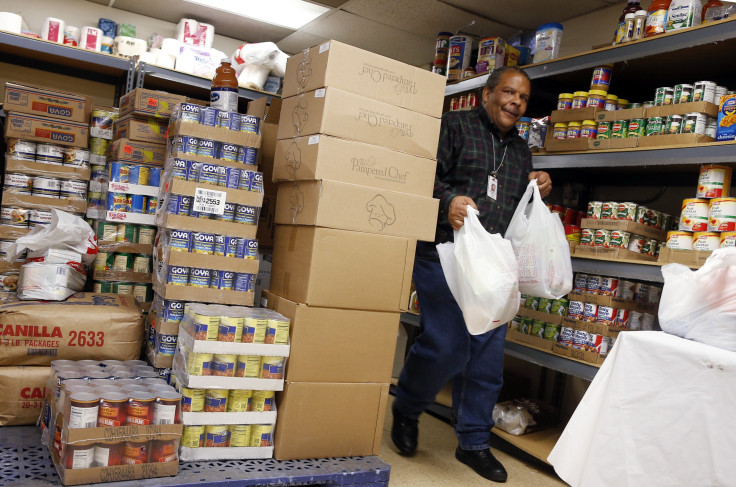Europe’s Booming Social Supermarket Concept Grows Slowly In US

Social supermarkets -- stores that sell surplus, dented and slightly damaged goods at discounted prices -- have been gaining popularity in Europe among low-income shoppers struggling with a bad economy. Now, the concept is slowly spreading in the U.S. and Asia.
London’s first social supermarket opened Monday. The store, called Community Shop, aims to give local shoppers access to deeply discounted surplus food from big British retailers including Tesco and Marks & Spencer, which would otherwise throw away items with damaged packaging or expired date markings. Expiration dates from manufacturers for many goods like pasta or canned beans indicate the product's best quality but not when it becomes inedible or harmful.
Community Shop joins more than 1,000 others similar to it across Europe and uses profits to fund programs such as cooking classes and debt advice for economically disadvantaged individuals.
Social supermarkets, unlike food banks, obtain food from distributors and retailers and sell it to customers. Food banks receive donations and give away the food for free. Food banks tend to cater to the homeless and unemployed who cannot afford groceries, while social supermarkets are geared toward those who may have a home and job but struggle to pay bills.
European social supermarkets began in Austria in the 1990s. They sell food that's still consumable but no longer of saleable quality to customers living in poverty or at risk of falling into poverty. In Europe, social supermarkets can receive food for free from retailers, but in the U.S., federal regulations prohibit an organization receiving food donations from selling the products.
Thus, the business concept is still relatively uncommon in the U.S., where there are nearly 400 social markets, according to industry researcher IBIS World.
“I know it’s kind of a trend in England,” said Jerry Brown, director of media relations at St. Mary’s Food Bank Alliance in Phoenix, Arizona. “We haven’t heard of anything like that near us, but it’s an interesting concept.”
St. Mary’s, the world’s first food bank in 1967, pioneered the modern food bank model in which individuals, companies, churches and other organizations “deposit” excess money and food for those in need to “withdraw” for free.
Doug Rauch, a former Trader Joe’s president who spent more than 30 years at the company, retired in 2008 and is now launching a salvage grocery store called Daily Table in the Boston area. The store was expected to open in September but hasn’t yet. Rauch plans to sell produce and other food items discarded from Trader Joe’s stores.
The U.S. Department of Agriculture estimates that about one-third of the food produced in the U.S. goes uneaten, amounting to an annual loss of about $161.6 billion. The estimate doesn’t include losses on farms and between farms and retailers; retailers such as grocery chains represented 10 percent of the loss and consumers 21 percent of the loss.
Still, many American food bank operators who point the hungry to food resources aren’t sure where to find salvage grocery stores in their areas, or if any exist. Spokespeople for food banks in Cincinnati; Cleveland; Austin, Texas; Atlanta; Memphis, Tenn.; Los Angeles; Syracuse, N.Y.; and other regions said Monday they hadn’t heard of social supermarkets nearby.
The first food bank in Europe wasn’t founded until 1984 in France, according to Vienna University economics and social supermarket researchers Christina Holweg and Eva Lienbacher.
Holweg estimates there are more than 1,000 social supermarkets across Europe, in France, Austria, Belgium, Luxembourg, Romania, Switzerland and the U.K. In the U.S., unlike in many parts of Europe, social supermarkets must compete with food banks to stock their shelves.
"There’s a large food banking network in the U.S," said Stacey Poore, spokesperson for Care and Share Food Bank in Colorado Springs. "I don't know if that food banking process works in other countries."
American manufacturers and retailers who donate food to American nonprofit organizations receive a tax credit. Selling the same goods would disqualify them from the tax credit, and reselling goods could disqualify organizations from nonprofit status.
But proponents of social supermarkets praise the concept for its profit-making, self-sustaining business model and the sense of ownership that charging for the food gives to low-income consumers. “They are able to make a choice of what items they wish to purchase, they're able to feel independent and with time, ideally, realize that they have it within themselves to break out of poverty,” said Desiree Yang, a 20-year-old social entrepreneur who is crowd-funding with her father to start Singapore’s and possibly Asia’s first social supermarket, SaltSteps. “They’re treated like customers, unlike when they get handouts.”
© Copyright IBTimes 2024. All rights reserved.




















